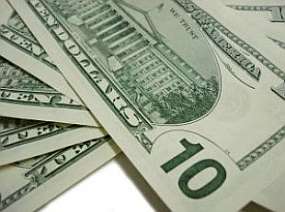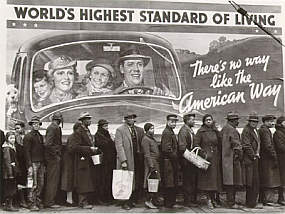The LORD makes poor and makes rich; he brings low and he exalts. He raises up the poor from the dust; he lifts the needy from the ash heap to make them sit with princes and inherit a seat of honor.
—1 Samuel 2:7-8a
Yesterday, a reader left this comment:
It’s even worse, it seems, on the black gospel music stations where most of the teaching and much of the music is infected with the widely popular health/wealth/prosperity “gospel.”
I’d like to comment on this by asking why it might be that so many black Christians find prosperity teachings attractive.  Sadly, that’s not a question too many opponents of the “prosperity gospel” dare ask because the ultimate answer strikes a little too close to home.
Sadly, that’s not a question too many opponents of the “prosperity gospel” dare ask because the ultimate answer strikes a little too close to home.
Consider a similar scenario. Evangelicals who went ballistic over the Emerging Church lacked the nerve to ask why the Emerging Church existed. Many times here, I discussed why: It was a reaction against Evangelicalism’s many blinders, especially on issues of nonexistent community, a lack of social justice for the oppressed, and rampant consumerism.
Yet rather than consider the possible truth of even one scrap of the Emerging Church protest, the loudest voices in Evangelicalism let loose with a tirade about the bad theology in the Emerging Church (and hey, let’s be honest, it was atrocious theology in many cases). Rarely, though, was there any Evangelical self-examination.
I find it both dispiriting and amusing that the very same Christians who idolize the Reformation revert to Catholic theology when it comes to these types of battles. It’s always their own sins that are venial, while their opponents’ are the most vile, wicked, mortal sins imaginable.
And the same is true of this battle over the so-called prosperity gospel.
It’s not for no reason that the prosperity gospel exists. This may only be my experience, but it seems to me that the loudest voices crying out against the prosperity gospel come from those people who never wanted a day in their lives for anything. They never went to bed hungry. Never saw all the other kids get nice toys for their birthday while they got busted up junk those others threw away. The people who complain loudest against prosperity teachings are most likely to be the same people whose money could buy them out of every problem, and whose lifestyles define prosperity, God or not.
You see, it’s darned easy to come down against someone’s misplaced hope of escaping poverty when you’re already prosperous. In many ways, that viewpoint is the same one that seeks to keep “those people” down, lest “those people” rise up and end the party. And that’s reprehensible self-righteousness and pride.
However, it’s equally reprehensible that many of the proponents of prosperity teaching get rich off the backs of their poor followers. Those false teachers and leaders deserve a special place in hell and may actually find that their hoped for heavenly mansion of gold ends up looking more like a lake of fire.
Yet for all the anti-prosperity-gospel talk out there, the Bible contains more words about prospering this side of heaven than the opponents care to address. The patriarchs were not a poverty-stricken lot. The Lord promises hundreds of times that He will pour out plenty on those who are obedient to Him. He rewards those who seek Him, and not just with spiritual gain, but also material. God leads His people into a land of milk and honey. The reaper overtakes the plowman.
I’m not going to try to proof text this point. If you must, just look up the word prosper in a concordance. God prospers his people both spiritually and materially. It’s there, really; I’m not making it up.
On the other hand, people who put all their trust in the material, who build huge barns to store all their accumulated worldly wealth, often run into an impoverishment of the soul. And that’s a state of being God is none too happy about.
Whether you’re a prosperity gospel fan or foe, whether you can trot out battling Bible verses to bolster your position, the solution to this theological war is found in an achingly simple response. You see God already shows us how to live in a way that satisfies both sides of this issue:
So those who received his word were baptized, and there were added that day about three thousand souls. And they devoted themselves to the apostles’ teaching and the fellowship, to the breaking of bread and the prayers. And awe came upon every soul, and many wonders and signs were being done through the apostles. And all who believed were together and had all things in common. And they were selling their possessions and belongings and distributing the proceeds to all, as any had need.
—Acts 2:41-45
Now the full number of those who believed were of one heart and soul, and no one said that any of the things that belonged to him was his own, but they had everything in common. And with great power the apostles were giving their testimony to the resurrection of the Lord Jesus, and great grace was upon them all. There was not a needy person among them, for as many as were owners of lands or houses sold them and brought the proceeds of what was sold and laid it at the apostles’ feet, and it was distributed to each as any had need.
—Acts 4:32-35
Folks, the point is moot. When the Church is living this way, no matter which side you are on in the prosperity gospel battle, you will find your answer here.
But you see, we don’t want to deal with those two passages in Acts because they stand as an indictment against how we live, whether we’re rich or poor. The greed and hard-heartedness that keeps us from fulfilling these passages in Acts today afflicts both those with and those without.
When I mention these verses and ask why we’re not living this way, a million excuses come out. I know; I’ve heard them all. It gets a little depressing.
So maybe in the eyes of God it doesn’t matter if we’ve gone off into “Lord, I name and claim a Lexus—a gold-colored one with goatskin leather seats,” or into the rich, young ruler’s perfect theology framing a heart of cold selfishness. The answer to the problem of the prosperity gospel is staring us in the face.
We simply don’t want to obey God and live it.
 The present economic disaster rests largely on the shoulders of the treacherous and deceitful, doesn’t it?
The present economic disaster rests largely on the shoulders of the treacherous and deceitful, doesn’t it?
 Sadly, that’s not a question too many opponents of the “prosperity gospel” dare ask because the ultimate answer strikes a little too close to home.
Sadly, that’s not a question too many opponents of the “prosperity gospel” dare ask because the ultimate answer strikes a little too close to home. During that time, I got a sinus infection and the doctor strongly recommended I get a series of X-rays taken to judge the severity of the infection. When I found out how much the X-rays would cost, I passed on them.
During that time, I got a sinus infection and the doctor strongly recommended I get a series of X-rays taken to judge the severity of the infection. When I found out how much the X-rays would cost, I passed on them.